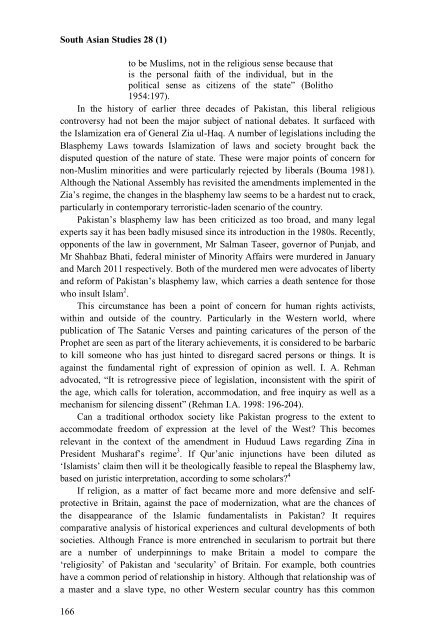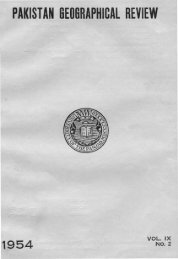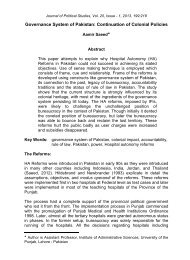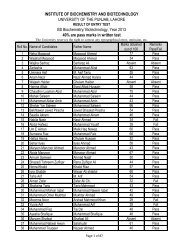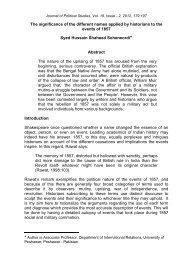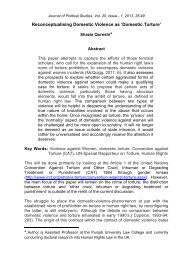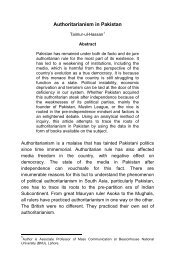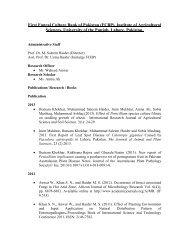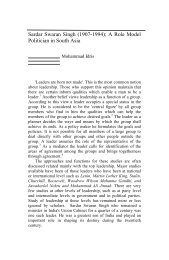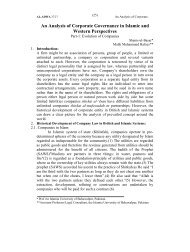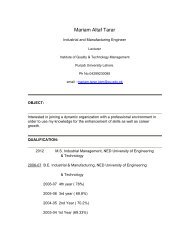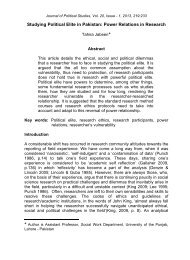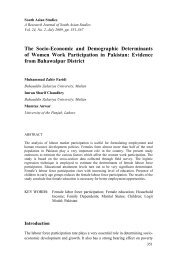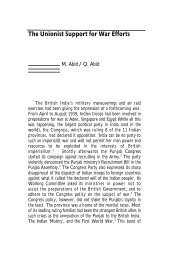Can Pakistan be a Secular State? - University of the Punjab
Can Pakistan be a Secular State? - University of the Punjab
Can Pakistan be a Secular State? - University of the Punjab
Create successful ePaper yourself
Turn your PDF publications into a flip-book with our unique Google optimized e-Paper software.
South Asian Studies 28 (1)<br />
to <strong>be</strong> Muslims, not in <strong>the</strong> religious sense <strong>be</strong>cause that<br />
is <strong>the</strong> personal faith <strong>of</strong> <strong>the</strong> individual, but in <strong>the</strong><br />
political sense as citizens <strong>of</strong> <strong>the</strong> state” (Bolitho<br />
1954:197).<br />
In <strong>the</strong> history <strong>of</strong> earlier three decades <strong>of</strong> <strong>Pakistan</strong>, this li<strong>be</strong>ral religious<br />
controversy had not <strong>be</strong>en <strong>the</strong> major subject <strong>of</strong> national debates. It surfaced with<br />
<strong>the</strong> Islamization era <strong>of</strong> General Zia ul-Haq. A num<strong>be</strong>r <strong>of</strong> legislations including <strong>the</strong><br />
Blasphemy Laws towards Islamization <strong>of</strong> laws and society brought back <strong>the</strong><br />
disputed question <strong>of</strong> <strong>the</strong> nature <strong>of</strong> state. These were major points <strong>of</strong> concern for<br />
non-Muslim minorities and were particularly rejected by li<strong>be</strong>rals (Bouma 1981).<br />
Although <strong>the</strong> National Assembly has revisited <strong>the</strong> amendments implemented in <strong>the</strong><br />
Zia’s regime, <strong>the</strong> changes in <strong>the</strong> blasphemy law seems to <strong>be</strong> a hardest nut to crack,<br />
particularly in contemporary terroristic-laden scenario <strong>of</strong> <strong>the</strong> country.<br />
<strong>Pakistan</strong>’s blasphemy law has <strong>be</strong>en criticized as too broad, and many legal<br />
experts say it has <strong>be</strong>en badly misused since its introduction in <strong>the</strong> 1980s. Recently,<br />
opponents <strong>of</strong> <strong>the</strong> law in government, Mr Salman Taseer, governor <strong>of</strong> <strong>Punjab</strong>, and<br />
Mr Shahbaz Bhati, federal minister <strong>of</strong> Minority Affairs were murdered in January<br />
and March 2011 respectively. Both <strong>of</strong> <strong>the</strong> murdered men were advocates <strong>of</strong> li<strong>be</strong>rty<br />
and reform <strong>of</strong> <strong>Pakistan</strong>’s blasphemy law, which carries a death sentence for those<br />
who insult Islam 2 .<br />
This circumstance has <strong>be</strong>en a point <strong>of</strong> concern for human rights activists,<br />
within and outside <strong>of</strong> <strong>the</strong> country. Particularly in <strong>the</strong> Western world, where<br />
publication <strong>of</strong> The Satanic Verses and painting caricatures <strong>of</strong> <strong>the</strong> person <strong>of</strong> <strong>the</strong><br />
Prophet are seen as part <strong>of</strong> <strong>the</strong> literary achievements, it is considered to <strong>be</strong> barbaric<br />
to kill someone who has just hinted to disregard sacred persons or things. It is<br />
against <strong>the</strong> fundamental right <strong>of</strong> expression <strong>of</strong> opinion as well. I. A. Rehman<br />
advocated, “It is retrogressive piece <strong>of</strong> legislation, inconsistent with <strong>the</strong> spirit <strong>of</strong><br />
<strong>the</strong> age, which calls for toleration, accommodation, and free inquiry as well as a<br />
mechanism for silencing dissent” (Rehman I.A. 1998: 196-204).<br />
<strong>Can</strong> a traditional orthodox society like <strong>Pakistan</strong> progress to <strong>the</strong> extent to<br />
accommodate freedom <strong>of</strong> expression at <strong>the</strong> level <strong>of</strong> <strong>the</strong> West? This <strong>be</strong>comes<br />
relevant in <strong>the</strong> context <strong>of</strong> <strong>the</strong> amendment in Huduud Laws regarding Zina in<br />
President Musharaf’s regime 3 . If Qur’anic injunctions have <strong>be</strong>en diluted as<br />
‘Islamists’ claim <strong>the</strong>n will it <strong>be</strong> <strong>the</strong>ologically feasible to repeal <strong>the</strong> Blasphemy law,<br />
based on juristic interpretation, according to some scholars? 4<br />
If religion, as a matter <strong>of</strong> fact <strong>be</strong>came more and more defensive and selfprotective<br />
in Britain, against <strong>the</strong> pace <strong>of</strong> modernization, what are <strong>the</strong> chances <strong>of</strong><br />
<strong>the</strong> disappearance <strong>of</strong> <strong>the</strong> Islamic fundamentalists in <strong>Pakistan</strong>? It requires<br />
comparative analysis <strong>of</strong> historical experiences and cultural developments <strong>of</strong> both<br />
societies. Although France is more entrenched in secularism to portrait but <strong>the</strong>re<br />
are a num<strong>be</strong>r <strong>of</strong> underpinnings to make Britain a model to compare <strong>the</strong><br />
‘religiosity’ <strong>of</strong> <strong>Pakistan</strong> and ‘secularity’ <strong>of</strong> Britain. For example, both countries<br />
have a common period <strong>of</strong> relationship in history. Although that relationship was <strong>of</strong><br />
a master and a slave type, no o<strong>the</strong>r Western secular country has this common<br />
166


